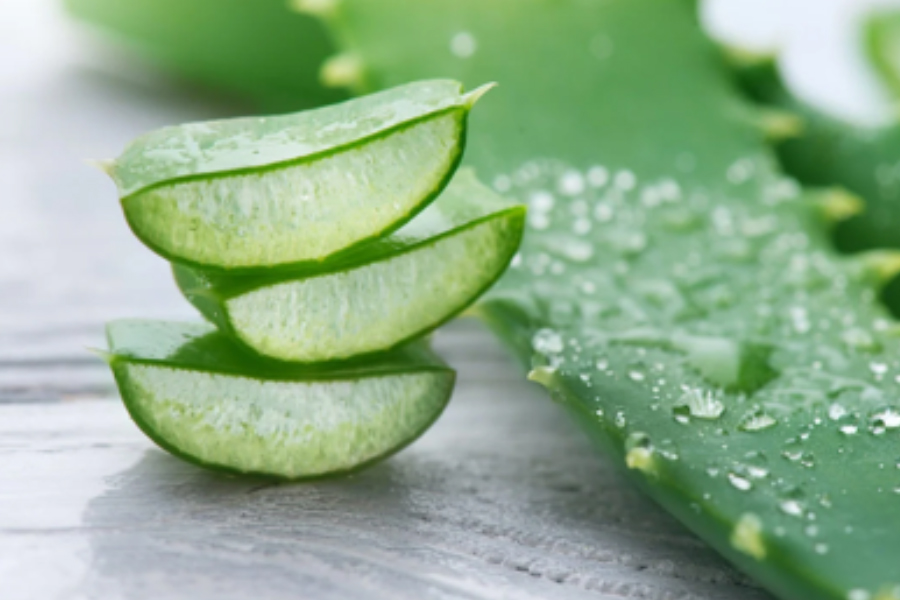Aloe vera is a plant with a long history of medicinal use in Ayurveda, the traditional medicine system of India. In Ayurveda, aloe vera is known as “the cure for everything” because of its ability to heal various ailments. It can be used externally or internally, and it has been shown to have anti-inflammatory and antibacterial properties.
The gel inside an aloe leaf contains enzymes which help protect the cells from damage caused by free radicals. Aloe vera also contains vitamins A, B1, B2, and C, as well as minerals such as silicon (which helps strengthen hair), iron (which helps improve circulation), calcium (which strengthens bones), and magnesium (which improves brain function).
How to Consume
Aloe vera juice is made by grinding up the pulp of the aloe vera leaf, which contains enzymes that promote healing. The juice can be consumed fresh or added to food or drinks like smoothies and salad dressings. Aloe vera juice has a mild taste that works well in both sweet and savory dishes.
Aloe vera juice comes in two forms: aloe vera gel and aloe vera leaf juice. Aloe gel typically contains more water than leaf juice, so it’s best used as a facial moisturizer or mixed into other liquids like water or coconut milk for smoothie recipes.
Benefits
-
Hair
Aloe vera is the perfect ingredient for your hair. It’s super moisturizing, so it helps to keep your hair hydrated and healthy. It also helps make it shiny, giving it a healthy glow that you won’t get enough of.
In addition to keeping your hair hydrated and moisturized, aloe vera can help with split ends. When you have split ends, your hair looks unhealthy and unkempt. Aloe vera helps repair those splits so that they don’t look insufficient, and you don’t have many of them!
It has vitamins A, C, and E and minerals, including potassium, calcium, magnesium, and iron. This makes it an excellent choice for promoting healthy hair growth.
It also contains amino acids that help repair damaged hair follicles. Its anti-inflammatory properties are great for preventing scalp infections and reducing inflammation on your scalp if you have an infection.
-
Skin
Aloe vera has been shown to hydrate the skin by robbing water from its surroundings and drawing it into the cells of your dermis. This leaves your skin feeling soft and smooth without any greasiness or irritation.
Aloe vera contains salicylic acid, which has anti-inflammatory properties that can help reduce redness and inflammation in your skin. Salicylic acid also helps reduce inflammation and helps prevent acne scarring because it encourages new collagen production in areas where scars form.
Aloe vera also contains lectins that bind to specific receptors on the cell surface. These lectins can stimulate collagen and elastin production in our bodies, which helps keep our skin looking smooth and firm.
-
Constipation
Aloe vera is a natural laxative, and it can help relieve constipation by softening the stool and increasing the frequency of bowel movements. It also helps improve the body’s ability to absorb nutrients from food. One of the many benefits of aloe vera is its ability to soothe and heal the digestive tract. It stimulates the movement of food through your digestive system, which helps to prevent constipation.
In addition to helping with constipation, aloe vera has other benefits that make it an appealing option for those looking for a natural remedy for their constipation. Those who suffer from haemorrhoids may find that aloe vera is helpful because it can reduce inflammation.
-
Oral Health
Aloe vera has been shown to have anti-inflammatory properties, which may help your mouth feel less irritated when you have a toothache or gum pain. It may also help reduce sensitivity to hot and cold foods or drinks, making it easier to eat what you want without discomfort.
Aloe vera can also be beneficial for those who have had recent dental work completed—it can help prevent swelling, making it difficult or painful to eat or usually drink following surgery or other procedures on your teeth. In addition, aloe vera may protect against plaque buildup by stimulating saliva production and promoting oral hygiene habits such as brushing your teeth regularly with fluoride toothpaste (which helps prevent dental decay)
-
Lower Blood Sugar Levels
Aloe vera is a plant that has been used for centuries to treat burns, sore muscles, and other skin conditions. It contains substances called polysaccharides, which have been shown to have anti-inflammatory properties and may help lower blood sugar levels in people with diabetes.
Aloe vera also contains antioxidants that may protect against damage to blood vessel linings caused by high blood sugar levels.
Scientists have also found that aloe vera may help reduce insulin resistance in people with type 2 diabetes by increasing the activity of an enzyme called glucose-6-phosphatase. This enzyme promotes the removal of glucose from the blood into cells.





